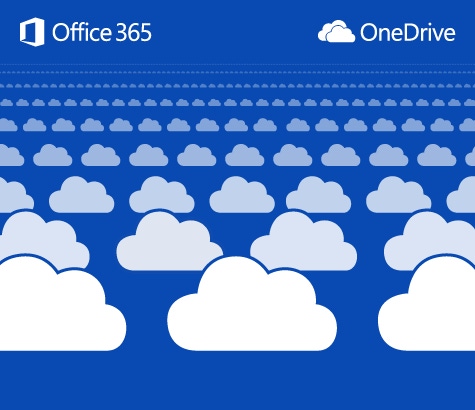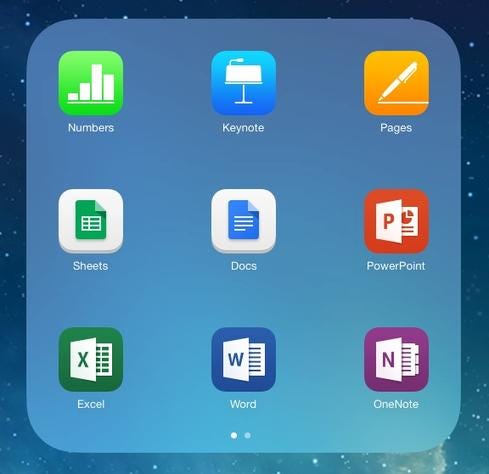Microsoft ups the ante in the cloud storage wars, offering unlimited OneDrive storage along with Office apps for as little as $6.99 per month.


Microsoft Office For iPad Vs. iWork Vs. Google
Microsoft Office For iPad Vs. iWork Vs. Google (Click image for larger view and slideshow.)
Cloud storage providers have been waging a price war in recent months, with almost all major vendors revamping their plans to offer more capacity for less money. Given the competition, it's seemed inevitable that one of the providers would eliminate cloud storage caps altogether -- not just for some enterprise packages, as Box and Google already have, but for general users. On Monday, Microsoft became the first to charge across that Rubicon.
"Today, storage limits just became a thing of the past with Office 365," Chris Jones, Microsoft corporate vice president of OneDrive and SharePoint, said in a Monday morning blog post. The company has already begun rolling out infinite storage to some Office 365 Home, Personal, and University subscribers, but the account upgrades will take a few months to complete. Eager Office 365 subscribers can visit a Microsoft website to request that their accounts be among the first to gain the new features.
Microsoft will begin upgrading business Office 365 accounts next year. Jones said the company will post more information to the Office 365 roadmap, a website the company recently established to give customers advance notice of upcoming feature changes.
Though some customers won't receive the extra storage until later, Microsoft's cloud storage products were already among the most competitively priced. Customers who signed up for Office 365 Home subscriptions before Monday's announcement paid $6.99 per month for 1 TB of OneDrive storage and Office software for one PC or Mac and one tablet. In comparison, Google and Dropbox each charge $9.99 per month for 1 TB of cloud storage.
With the newest move, Microsoft has not only undercut its cloud rivals, but it has also shrewdly protected its Office empire. As mobile devices with limited physical storage options have become more popular, demand for cloud storage has increased. If customers are simply looking to get the most storage for their money, Microsoft now offers the most accessible option -- and the company tosses in full access to Office apps almost as a bonus. Critics of Microsoft Office often point out that, whereas Microsoft charges for its productivity suite, many competing products -- such as Google's Docs, Sheets, and Slides trio -- offer much of the same functionality for free. But as Office has been tightly tied to Microsoft's cloud products, Office 365's value proposition has become somewhat harder to criticize.
[What's new with Windows 10? Read Windows 10 Evolves: 7 Facts.]
It's easy to imagine customers who will be intrigued by Microsoft's new offer. Many of the new iPhone 6 models currently flying off shelves come with only 16 GB of onboard storage, for example. Apple gives users 5 GB of free iCloud Drive cloud storage and then offers 20 GB, 200 GB, 500 GB, and 1 TB packages for monthly rates of 99 cents, $3.99, $9.99, and $19.99, respectively. To some users who don't need terabytes upon terabytes of storage, the convenience of iCloud Drive and its tight integration with Apple's ecosystem might be desirable. But with features such as auto-upload of a smartphone's camera roll, Microsoft has made it easy for users of other platforms to maximize OneDrive. Last month, Microsoft pushed OneDrive as a solution to iPhone users who struggled with iOS 8's relatively heavy storage requirements.
Given Microsoft's aggressive new Office 365-One Drive bundles, it will be no surprise if competitors revise their prices. Major cloud storage vendors have been reacting to one another's moves for months. Earlier this year, few of the major providers offered packages with more than 1 TB of storage, and those that did generally charged more than $100 in monthly subscription fees.
Still, as storage gets cheaper, it remains to be seen if unlimited storage -- as opposed to the more common 1 TB plans -- will motivate customers. It also remains to be seen how customers will weigh ecosystem integration and bundled features, such as extra security or included software, against pure storage capacity. In the meantime, vendors will be placing their bets. Box, for example, has responded to price pressure by recasting itself as a platform with expanding integration for Office 365.
Just when conventional wisdom had converged around the cloud being a software story, there are signs that the server market is poised for an upset, too. Get the 2014 State of Server Technology report today (free registration required).
About the Author(s)
You May Also Like







